|
|
|
Sort Order |
|
|
|
Items / Page
|
|
|
|
|
|
|
| Srl | Item |
| 1 |
ID:
066939


|
|
|
| 2 |
ID:
191595
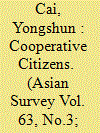

|
|
|
|
|
| Summary/Abstract |
The Chinese government has effectively adapted to the new environment in which information flow is greatly facilitated by the wide use of social media. This adaptation is aided not only by its resources and learning ability but also by citizens supportive of the regime. Content manipulation and censorship are the two primary approaches used by the Chinese government to manage social media. This paper examines how supportive citizens help the state manage cyberspace by tipping off state agencies. The state encourages tip providers by responding to tips, including political ones, and sometimes by rewarding the provider. Tip providers reduce the cost of monitoring social media, enhance the legitimacy of censorship, and discourage and marginalize regime critics. The presence of tip providers reflects and reinforces the split or ideological polarization among the population.
|
|
|
|
|
|
|
|
|
|
|
|
|
|
|
|
| 3 |
ID:
072715
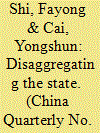

|
|
|
|
|
| Publication |
2006.
|
| Summary/Abstract |
Collective action directed at the government is not rare in China, but why some actions endure and succeed whereas many others fail remains inadequately addressed. Based on a case of home owners' sustained collective resistance in Shanghai, this study finds that state power is fragmented at the local level. While the disparate priorities among different levels of state authorities provide opportunities for resistance, social networks between participants of collective action and officials or media workers may significantly help the former to achieve success.
|
|
|
|
|
|
|
|
|
|
|
|
|
|
|
|
| 4 |
ID:
122317


|
|
|
|
|
| Publication |
2013.
|
| Summary/Abstract |
Ensuring the accountability of state agents requires the use of reward and sanction. Like other authoritarian regimes, the Chinese Party-state faces a dilemma in dealing with malfeasant agents: unprincipled tolerance undermines the regime's legitimacy, but disciplining officials may demoralize agents and result in the loss of state investment in them. Given this dilemma, selective or differentiated discipline becomes a logical choice. Using the case of social conflict management by local officials, this article explores the political rationale behind the use of selective discipline in China. It finds that two factors significantly affect the likelihood of an official being punished for mishandling social conflict: the severity of the consequences of the official's failure, and his or her role in the failure.
|
|
|
|
|
|
|
|
|
|
|
|
|
|
|
|
| 5 |
ID:
124637
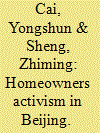

|
|
|
|
|
| Publication |
2013.
|
| Summary/Abstract |
It is commonly accepted that leaders play a crucial role in collective action. Existing literature has suggested a number of factors that contribute to the emergence of leaders including, among others, personality, sense of moral responsibility, community pressure, self-interest and institutional exclusion. However, current research tends to suggest that activists are driven by a particular reason to become leaders and that their motivation is static. Based on intensive fieldwork in residential communities in Beijing, this article illustrates that leaders' motivations can be mixed or multiple and that leaders may re-prioritize or adjust their objectives over the course of collective action. The re-prioritizing tends to alter the leaders' behaviour and affect group solidarity and interactions with other group members.
|
|
|
|
|
|
|
|
|
|
|
|
|
|
|
|
| 6 |
ID:
145789
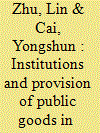

|
|
|
|
|
| Summary/Abstract |
In societies where formal institutions are absent or weak, informal institutions
are found to serve as mechanisms that enhance government
accountability. Pertinent research on China has come up with similar
findings. But two issues have not been adequately addressed in existing
research. One is the relationship between formal and informal institutions
in shaping government behavior if both types of institutions exist.
The other is the factors that affect the (re)emergence of informal institutions.
Based on a survey of about 800 villages in Guangdong province,
this article shows that the existence of both formal and informal institutions
may enhance government accountability in the provision of public
goods. Factors such as community history and practical needs
contribute to the (re)emergence of informal institutions.
|
|
|
|
|
|
|
|
|
|
|
|
|
|
|
|
| 7 |
ID:
081521


|
|
|
|
|
| Publication |
2008.
|
| Summary/Abstract |
Local governments are responsible for dealing with many of the instances of resistance in China, and an important mode of response which they use is suppression. This article examines the rationale behind local governments' use of this mode of response. It shows that Chinese citizens who stage resistance are in a weak legal position because their actions often violate the law or government regulations. Given local governments' discretion in interpreting citizens' action, suppression becomes the option when concessions are difficult to make and citizen resistance threatens social stability, policy implementation or local officials' images. However, suppression has not stopped popular resistance, and it remains a channel through which citizens defend or pursue their legitimate rights in China
|
|
|
|
|
|
|
|
|
|
|
|
|
|
|
|
| 8 |
ID:
130963
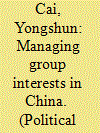

|
|
|
|
|
| Publication |
2014.
|
| Summary/Abstract |
Monopolistic Industries IN CHINA have been criticized heavily in recent years for their unrestrained pursuit of interests at the expense of the public or other parties.1 Such criticisms are not unfounded, as exemplified by the Chinese oil industry. In China, the China National Petroleum Corporation and the China Petroleum and Chemical Corporation, together with the China National Offshore Oil Corporation, have monopolized the oil supply in the country.2 In 2006, China had approximately 660 privately owned oil wholesale enterprises and 45,060 privately owned gas stations. However, by early 2008, two thirds of the wholesale enterprises and one third of the gas stations were closed, and another 10,000 gas stations lost money. This situation was a result of a monopoly of the oil industry by state-owned companies. When oil prices were high, the China National Petroleum Corporation and China Petroleum and Chemical Corporation refused to provide oil to privately owned companies. The national government agencies repeatedly urged the two companies to provide oil to private businesses. The premier and vice premiers also gave 14 instructions to require them to provide oil. But all of these were largely ignored by the two companies
|
|
|
|
|
|
|
|
|
|
|
|
|
|
|
|
| 9 |
ID:
170192


|
|
|
|
|
| Summary/Abstract |
Because of the heavy burden that the resolution of social conflicts imposes on the Chinese government, the government is motivated to delegate or shift its conflict resolution responsibilities to specialized institutions, including social organizations. However, the effectiveness of responsibility shifting is conditional on the types of conflict and social contexts. Focusing on the resolution of medical disputes in China, this article examines the conditions under which the government can avoid direct and heavy involvement in dispute resolution. The government can effectively delegate the responsibility for resolving conflicts when the disputing parties perceive the mediation agencies as impartial. Having effective institutions thus limits government intervention to only a small number of disputes. This study is based on an analysis of 1351 medical disputes and about 80 interviews with parties involved in dispute resolution.
|
|
|
|
|
|
|
|
|
|
|
|
|
|
|
|
| 10 |
ID:
146904


|
|
|
|
|
| Summary/Abstract |
People who rely on new information technologies to orchestrate protests face a common-knowledge constraint: the information on a proposed protest they release to potential participants can also be known by the government. This article examines the conditions under which protests mobilized through new information technologies become possible in China.
|
|
|
|
|
|
|
|
|
|
|
|
|
|
|
|
| 11 |
ID:
166870
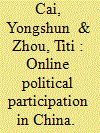

|
|
|
|
|
| Summary/Abstract |
Chinese citizens commonly take to the internet to voice complaints concerning their daily lives. The political hierarchy in China dictates that local governments are primarily responsible for addressing such grievances. This study investigates how local governments deal with online complaints and finds that they respond in a variety of ways and that their choice of a particular form of response is shaped by the pressure generated by the complaint and the cost of resolving it. This study contributes to the understanding of government responsiveness in China by directly assessing the quality of governmental responses and by measuring the pressure and costs faced by the government when dealing with online complaints. It also explains how the Chinese government, without having to rely on censorship, shields regime legitimacy from media exposure.
|
|
|
|
|
|
|
|
|
|
|
|
|
|
|
|
| 12 |
ID:
093849


|
|
|
| 13 |
ID:
081199


|
|
|
| 14 |
ID:
181400
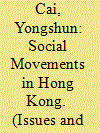

|
|
|
|
|
| Summary/Abstract |
Social movements occur not only because of political opportunities but also due to a perceived threat to citizens. Popular contention has remained an important mode of political participation in Hong Kong since 1997 when its sovereignty was handed over to China. Many influential collective actions in Hong Kong occurred when residents felt a threat had arisen from policies made by the city government or Beijing. By examining the Anti-Extradition-Bill movement in Hong Kong, this paper explores how threat triggers and sustains social movements. It finds that threat both facilitates the mobilization of social movements and sustains them. Threat strengthens solidarity among movement supporters because of their shared concerns and goals. It sustains a movement when government responses confirm participants’ belief in the continual existence of the threat. The Anti-Extradition-Bill movement deepened the distrust between local residents and Beijing, resulting in the promulgation of the National Security Law by Beijing in May 2020.
|
|
|
|
|
|
|
|
|
|
|
|
|
|
|
|
| 15 |
ID:
059607


|
|
|
| 16 |
ID:
181207


|
|
|
|
|
| Summary/Abstract |
Protesters in China may face two types of targets. One is the target of blame that is deemed responsible for causing their grievances, whereas the other is believed to be obligated to solve their grievances. Upward targeting occurs when citizens whose grievances are connected to lower-level authorities approach higher-level authorities for solutions. Based on a collection of over 12,000 instances of collective protest in China from 2000 to 2018, this study finds that some groups—such as small groups, veterans, and petitioners—are more likely to resort to upward targeting than others. However, collective actions directed at central authorities are more likely to be suppressed. Blame attribution and the difficulties in coordinating large-scale upward-targeting actions have combined to manifest protest patterns in China.
|
|
|
|
|
|
|
|
|
|
|
|
|
|
|
|
|
|
|
|
|